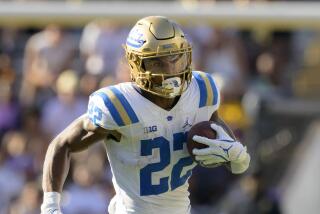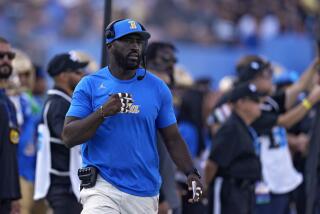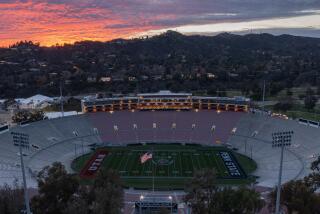The Rose Bowl moved in 1942, the only time the game hasnât been played in Pasadena. Hereâs why
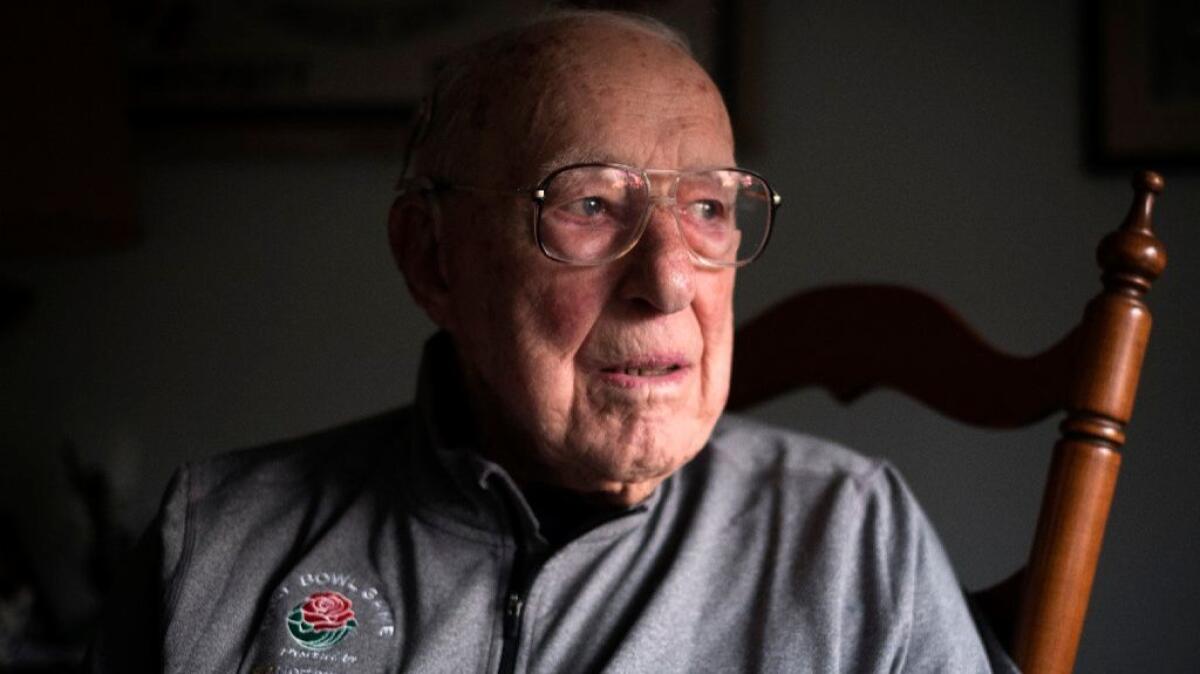
A cold rain fell that New Yearâs Day, and as the Duke football team ran onto a soggy field, one of the players joked that they should have worn boots instead of cleats.
The Blue Devils had envisioned something more pleasant when, about a month earlier, they accepted an invitation to the 1942 Rose Bowl.
âWe were thinking about warm weather,â says Jim Smith, the last surviving player from that game. âThe glamour of Southern California.â
The bombing of Pearl Harbor changed all that.
The U.S. entered World War II, and officials â concerned about a Japanese attack on the West Coast â hastily canceled the parade and game.
In the weeks that followed, Duke and Oregon State scrambled to make contingency plans, moving the whole production 2,500 miles east to a small campus stadium in Durham, N.C.
No parade. No sunny sky. No Hollywood sparkle.
The 1942 game remains the only Rose Bowl played outside of Pasadena.
Seventy-five years later, the Tournament of Roses will commemorate that day, showing a video in the moments before USC plays Penn State. A few minutes will not be enough to tell the whole story.
âRealizing the situation that confronted the country,â the late George Zellick, an Oregon State end, told The Times in 2008, âwe were grateful the game was played at all.â
::
In the early 1940s, the champion of the Pacific Coast Conference got to choose its opponent for New Yearâs Day.
Oregon State â by virtue of a 7-2 record and a victory over rival Oregon in the regular-season finale â wanted No. 1 Minnesota, but the Gophers were barred from postseason play by their conference.
Second-ranked Duke was the second choice, and the Blue Devils quickly accepted. Smith recalls: âWe were elated.â Their delight lasted less than two weeks â until the Japanese raid.
The Rose Bowl had continued through World War I, but this situation was different.
President Franklin D. Roosevelt warned the American public about further attacks on U.S. soil. On Dec. 13, military leaders contacted California Gov. Culbert Olson, who then sent a directive to the Tournament of Roses Assn.
Olsonâs telegram said that âthe unusually large gathering of people known to the enemy, exposing them to the dangers now threatening, requires that plans for holding of this tournament and football game be abandoned.â
The Rose Bowl wasnât the only sports event disrupted. Santa Anita canceled its winter meeting, and the East-West Shrine Game moved from San Francisco to New Orleans.
Days after the announcement, the Chicago Tribune proposed staging the Rose Bowl at Soldier Field. Officials in Dallas, Washington, D.C., and other cities also stepped forward.
Dukeâs coach had something else in mind.
Wallace Wade had an affinity for the Rose Bowl, playing there for Brown in 1916 and returning as coach of Alabama and the Blue Devils. But there was some bad blood.
In 1939, after his powerful Duke team was upset, 7-3, by USC, he declined an invitation to meet with Trojan quarterback Doyle Nave, saying: âIâve already seen too much of him.â
The comment was taken as a slight by West Coast media, said Brian Curtis, author of a new book titled âFields of Battle: Pearl Harbor, the Rose Bowl and the Boys Who Went to War.â But tournament officials had another reason for resisting Wadeâs overtures in late December 1941.
âIt meant no parade,â Curtis said. âIt meant they had no control over the game.â
Wade â respected throughout college football â would not be deterred.
âHe is a bird-hunting, book-reading, God-fearing old-timer,â the New York World-Telegram wrote of him that year. âAnd he doesnât care very much whether you like him or not.â
::
Convincing the tournament association was only part of the challenge. No sooner was a deal struck than Wade faced dissent on his own team.
âWe voted not to play in Durham,â Tommy Prothro, the Duke quarterback who later would coach Oregon State and UCLA, said at the time. âWeâd all been looking forward to playing in California, and when we found out the game was going to be in Durham, well, we were real disappointed.â
It took some persuasion â and another vote â for the Blue Devils to relent. Meanwhile, at Oregon State, a different sort of problem arose.
Two men in overcoats and hats showed up at a football practice one afternoon. They were FBI agents, and they wanted to speak with Jack Yoshihara, a sophomore reserve.
By that time, Japanese Americans had been deemed âenemy aliensâ and faced travel restrictions. The agents informed Oregon State that Yoshihara would not be permitted to accompany the team when it played in the Rose Bowl.
Yoshihara soon left school and ended up at the Minidoka internment camp in Idaho.
âWe knew the world was changing,â he told The Times in 2008. âWe just didnât know how much it was going to change.â
His teammates departed from Corvallis by train, making the trip eastward, with a stop to practice in Chicago and a visit to Washington, D.C., for sightseeing and a brief workout.
At Duke, administrators were busy enlarging their stadium, adding bleachers behind one end zone. The resulting 56,000 tickets sold out in a matter of days.
Even with the expanded capacity, the school decided not to include segregated seating for African Americans, as had been its tradition. A local newspaper criticized administrators, noting that Japanese Americans would be allowed through the gates, and an extra 140 seats were quickly rustled up.
âAfrican Americans were among the biggest supporters of Wadeâs team,â Curtis said. âBut if it wasnât for that editorial, they wouldnât have come up with those tickets.â
Oregon State pulled into town on Christmas Eve and the team was escorted to its hotel by the Durham High School marching band. The next night, the players were treated as guests of honor at a Christmas dinner.
âWe didnât know much about them,â Smith said. âBut we had great respect.â
Back in Pasadena, on New Yearâs morning, seven teenage girls rode down Colorado Boulevard, passing empty grandstands, still dressed in their street clothes.
The Rose Parade queen and her princesses took part in a miniature parade with 33 tiny, flower-covered floats at the Huntington Hotel.
::
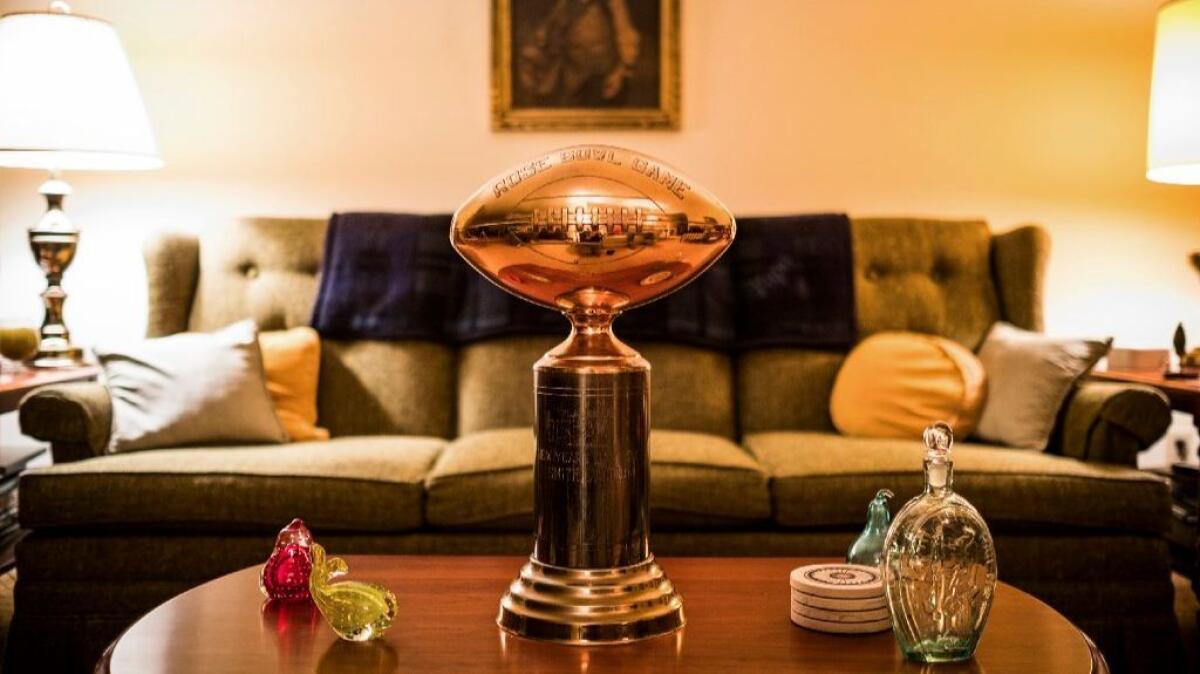
At some point leading up to the game, an NBC radio announcer suggested Duke could probably beat Oregon State by throwing 11 helmets onto the field.
The Blue Devils, who had scored at least 34 points a game that season, were favored by almost two touchdowns. But the Beavers seemed to like the underdog role and got some help from the weather.
âLet me put it this way: It couldnât have been worse,â Smith said.
Dukeâs team, built on speed, was unaccustomed to the chilling fog and rain that hit Durham that Jan. 1. When the Blue Devils fumbled the opening kickoff, it was the first of seven turnovers.
Their sloppy play helped the Beavers â whose defense had surrendered only 33 points all season â stay close.
The score was tied in the third quarter when Oregon Stateâs Gene Gray caught a pass in Duke territory and slipped a tackle, outrunning the secondary for a 68-yard touchdown and a 20-14 lead.
The Blue Devils had opportunities to come back, mounting three drives in the final minutes but coming up empty each time. A late safety closed the gap to 20-16, but their final possession ended with an interception.
Renowned sportswriter Grantland Rice described Oregon State as âa strong, husky-looking bunch who gave you the idea they had been used to hard battling â and could give it and take it.â
The Beavers celebrated their victory by stopping in New Orleans on the way home. Their captain, Martin Chaves, told The Times in 1987: âThat game meant everything to us.â
But reality began to take hold as the team rolled across the country. A number of players got off the train in their hometowns, wanting to visit family one more time before going off to war.
::
The Japanese were already on the defensive in the summer of 1942, pushed back in the Coral Sea and at the Battle of Midway. American officials deemed it safe for the 1943 Rose Bowl to return home after a year away.
By that time, many of the 80 or so players who took the field in Durham on the previous New Yearâs Day were in the military.
Wade left his coaching job to enlist in the Army and, during the Battle of the Bulge, ran into Oregon State tackle Stan Czech.
Charles Haynes of Duke and Frank Parker of Oregon State reunited during the march through Italy. Haynes was wounded in battle and left for dead; some 17 hours later, Parker, fighting on a nearby hill, heard about it and raced back to rescue him.
Gray, who caught the winning touchdown pass in the 1942 game, survived multiple bombing runs over Europe as a pilot, but he later was injured when his military plane crashed in Panama. He lost both of his arms.
In all, four players â three from Duke and one from Oregon State â were killed in action.
âThe war was inevitable,â Smith said. âWe all knew we were going.â
The 95-year-old, who lives in Louisville, Ky., will appear in the video shown at next monthâs game. He will speak a few words, then introduce the Penn State band to play the national anthem.
All these years later, Smith said he is honored to be part of Rose Bowl history. He has watched the game on television each year, still enthralled by what he calls âa beautiful stadium.â
There is a bit of wistfulness in his voice as he talks about 1942. Asked whether he regrets not getting the chance to step foot on the field in Pasadena, he answers without hesitation.
âI donât know how to emphasize it more,â he says. âYes. Yes. Yes.â
ALSO
Itâs a new USC that begins to prepare for Penn State in the Rose Bowl
Our experts predict the bowl game results, Week 1
Jared Goff in concussion protocol following big hit in Ramsâ loss to Seahawks
More to Read
Go beyond the scoreboard
Get the latest on L.A.'s teams in the daily Sports Report newsletter.
You may occasionally receive promotional content from the Los Angeles Times.

